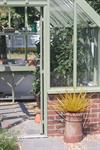Learn to get more from your Greenhouse!
Growing protected plants is a specialised field of horticulture requiring detailed knowledge.
Course structure and content
Course Aim
Successful completion of this course/module will develop your broad understanding of practices and processes involved in successful protective plant cropping.
It will develop a clear understanding of environmental control and plant growth within a protective environment, together with a practical knowledge of plant husbandry techniques.
This course has seven lessons:
1. Structures for Protected Cropping
2. Environmental Control
3. Cladding Materials and their Properties
4. Irrigation and Nutrition
5. Relationship between Production techniques and Horticultural practices
6. Harvest and Post Harvest Technology
7. Risk Assessment
Aims
- Describe and Evaluate the type and shape of modern growing structures.
- Describe and evaluate environmental controls in protected cropping.
- Explain the nature of solar radiation, transmission properties of glass and its substitutes.
- Determine the water requirements of a crop; and methods of irrigation.
- Relate horticultural principles to the production and harvesting of a range of crops.
- Evaluate the factors involved in marketing protected crops.
- Undertake risk assessment.
Protection changes many things
 When you grow a plant inside a greenhouse, or inside any other protected structure, many things change; some obvious and others not so obvious. The temperature is able to be controlled (usually made hotter, but sometimes cooled), and humidity is often higher (which can help plant growth, but may also promote disease). Wind is normally reduced, and light levels are sometimes controlled.
When you grow a plant inside a greenhouse, or inside any other protected structure, many things change; some obvious and others not so obvious. The temperature is able to be controlled (usually made hotter, but sometimes cooled), and humidity is often higher (which can help plant growth, but may also promote disease). Wind is normally reduced, and light levels are sometimes controlled.
A less obvious effect is that levels of different gases in the air can become quite different to the air outside. In some instances, this may be an advantage; but it can also be a disadvantage. Consider Ethylene levels.
Ethylene is a gas produced by the incomplete combustion of hydrocarbons. All parts of all flowering plants produce ethylene, with the greatest concentration produced in ripening climacteric fruits. It is a natural growth regulator in plants, and is produced commercially under the trade name Ethrel.
The physiological effects of ethylene include the following:
- Fruit ripening, especially in climacteric fruits, which includes tomatoes, avocadoes, apples and pears. (By contrast, non-climacteric fruits such as strawberries, grapes and citrus synthesise only very small amounts of ethylene and are not induced to ripen by it.) This effect is very important for post-harvest storage and ripening: tomatoes are picked green and stored in the absence of ethylene then treated with ethylene prior to sale; grapes are also hastened to ripen with ethylene.
- Abscission (dropping) of flowers, leaves and fruit in a range of plants. Ethylene is used commercially as a fruit thinning agent in commercial prune and peach orchards. It is also used to promote fruit loosening which makes mechanical harvesting easier, in cherries, grapes, blueberries and blackberries.
Auxins (a type of hormone) have the ability to increase ethylene production in some plants. The interactions between the two hormones is responsible for varying physiological effects including inhibition of stem, root and leaf elongation, flower induction in bromeliads and mangoes, increased percentage of female flowers in dioecious plants, and apical dominance.
At high concentrations (5-10%), Carbon Dioxide (CO2) inhibits many ethylene effects. For this reason, CO2 is often used to prevent over ripening of harvested fruits.
Learning to grow plants in a protected structure can be complex; but armed with the knowledge of this course, you will have a foundation to develop skills faster and more thoroughly, to produce fruit, flower, vegetable or other crops, out of season; optimising productivity and profitability of a horticultural enterprise.
Why Study with ACS?
Design your own learning pathway.
Study at your own pace, from anywhere, at any time.
Receive prompt, expert support from our team of committed and friendly tutors.
Your learning is our priority. We are flexible and adaptable to meet your educational needs!
Enrolling is easy - just go to the top of this page and select your study method and payment option.
If you have any questions about studying with ACS, or want to know more about any of our courses, get in touch with our specialist tutors today.
They will be happy to answer your questions and look at different study options to fit in with your goals.